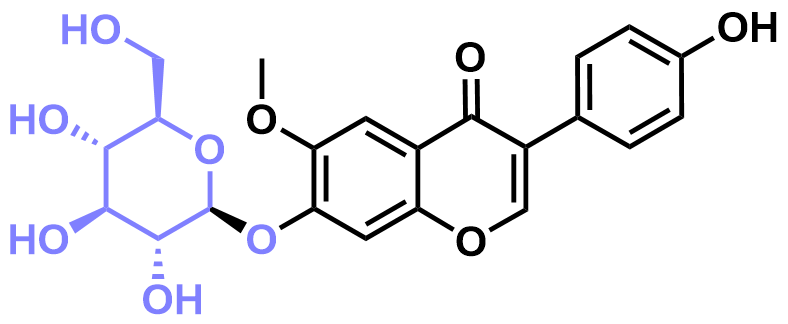Glycitin Analysis Service
- Quick Analysis Cycle and Cost-Effective
- Reliable, Consistent, and Highly Sensitive Results
- All-in-One Service for Wide-ranging Testing Requirements
- User-Friendly Operation with Extensive Application Potential
- Pharmaceutical research
- Nutraceutical research
- Metabolic pathway studies
- Environmental toxicology studies
Glycitin is an isoflavone glycoside compound that belongs to the flavonoid class of plant secondary metabolites. It is commonly found in various leguminous plants, particularly in soybean (Glycine max). Glycitin is one of the major isoflavones present in soy products, along with daidzin and genistin, and is often studied for its potential health benefits. The chemical structure of glycitin consists of an isoflavone core made up of a 4-oxo-benzopyranone ring and a benzene ring, with a glycoside moiety attached. Its molecular formula is C22H22O10.
In the body, glycitin is primarily hydrolyzed and metabolized into its aglycone form, glycitein. In the gastrointestinal tract, the glycosidic bond of glycitin is cleaved by hydrolase enzymes, releasing glycitein. Glycitein can then undergo further metabolic transformations into other metabolites, such as dihydroglycitein or its sulfate and glucuronide conjugates, which are typically excreted in the urine.

Figure 1. The Structure of Glycitin
MtoZ Biolabs is proud to present our advanced Glycitin Analysis Service. Leveraging our state-of-the-art high-performance liquid chromatography-mass spectrometry (HPLC-MS) platform and backed by an experienced metabolomics team, we provide comprehensive glycitin analysis with high sensitivity and precision.
Analysis Workflow
Service Advantages
Applications
Sample Submission Requirements
1. Sample Types: Serum, plasma, urine, tissue homogenates, and other biological samples.
2. Sample Volume: Minimum 200 μL of liquid sample or 200 mg of solid sample.
3. Sample Preservation: Store at -80°C to ensure stability.
Note: Provide specifics on sample collection and handling.
Deliverables
1. Experimental Procedures
2. Relevant Liquid Chromatography and Mass Spectrometry Parameters
3. Detailed Information on Glycitin
4. Raw Data
5. Tailored Analysis Report
With our glycitin analysis service, we aim to support your research and product development processes by delivering accurate and reliable results.
How to order?







